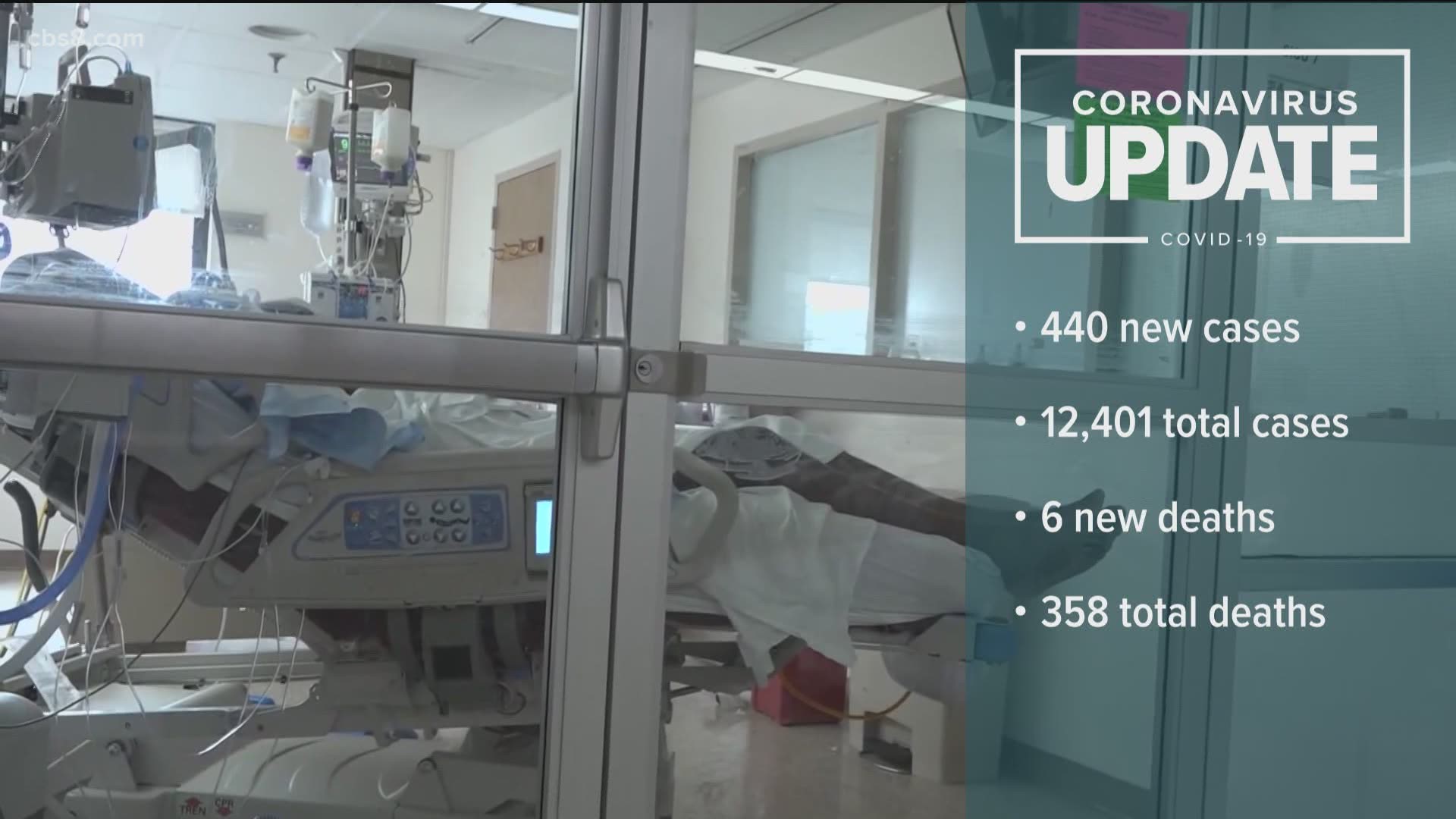SAN DIEGO COUNTY, Calif. — For the fourth time in a week, San Diego County public health officials reported a record-high number of daily COVID-19 cases, with 440 new positive cases recorded on Friday.
It's the fifth time in six days that health authorities reported more than 300 new COVID-19 cases and the first day with new cases topping 400. The total number of cases recorded since the pandemic began is now 12,401, and with six additional deaths reported Friday, the number of deaths increased to 358.
Of those deaths, four men and two women died between June 13 and June 24, and ranged in age from the late 50s to the mid-90s. All had underlying medical conditions.
The county recorded 6,824 COVID-19 tests Friday, 6% of which returned positive. The 14-day rolling average positive test rate is 3.4%.
More than 300 cases were reported on Sunday, Monday, Wednesday and Thursday this week.
Along with this record number of COVID cases, San Diego County also hit another trigger on Friday.
The average number of patients hospitalized with coronavirus has jumped 19 percent in the last three days, surpassing the prescribed 10 percent trigger point.
This came as the governor of California once again appealed to Californians to use a face covering when out of their homes and within six feet of a non-household member.
"We are entering into a weekend in which, as is so often the case, people let their guard down," Governor Gavin Newsom said.
Californians letting their guard down over the past several weeks -- not wearing a face covering and not social distancing -- likely played a role in the increased numbers of coronavirus cases we are seeing now.
Hospitalization and ICU rates are also continuing to rise.
"These trend lines over the last 7 days, 14 days, are disturbing," Newsom said.
They have been nowhere more disturbing currently in California than in Imperial County, where the positivity rate is approaching a staggering 23%.
"The 23% tells us not only that there are many cases but there are likely very many undetected cases," said Dr. Sonia Angell, California Department of Public Health Director and State Health Officer.
"We are advising and counseling (Imperial County officials) to move forward and re-institute the stay-at home-order, but they will move at their discretion," Newsom added.
Other counties are already using their discretion to dial back.
San Francisco, for instance, has halted its planned Phase 3 re-opening which had been set for Monday.
Statewide, California will not be entering Phase 4 for the foreseeable future.
Disneyland, for example, is postponing its reopening until it gets guidance from the state.
"That is the case," Newsom said. "We are at a pause, and have been for over a week now."
Here in San Diego County, community outbreak was reported Friday in a business, bringing the number reported in the last week to six -- falling below the threshold the county set in a set of 13 "triggers" announced earlier this month for the first time since June 18.
Community-transmitted COVID-19 outbreaks activated one of those triggers on that date, placing a pause on any additional openings allowed by the state.
The county could take industry-specific actions, pause all reopening efforts or even dial back reopenings if enough of the metrics rise above a certain threshold. The threshold for community outbreaks -- defined as three or more lab-confirmed cases from different households -- was fewer than seven in a week's span.
A "modest uptick" in the number of hospitalizations and ICU visits also has officials worried.
"The sense of community we brought together at the beginning of this to slow the spread is the same one we need to summon now," County Supervisor Nathan Fletcher said Wednesday. "It's natural to see the spread when things start to reopen. What we want to avoid is an exponential spread."
Fletcher said individual choices to do everything possible to prevent the spread would be vital in the coming weeks. Frequent hand washing, wearing facial coverings in public and maintaining social distancing would all continue to make the difference in how quickly the illness makes its way through the community.
Fletcher and his wife, Assemblywoman Lorena Gonzalez, announced late Thursday afternoon they are going into quarantine due to possible coronavirus exposure.
"We were notified today that we had close contact with an individual who has tested positive for COVID-19," Fletcher and Gonzalez said in a joint statement Thursday. "While we have both tested negative and have no symptoms, we will be following the public health guidance of a 14-day quarantine for those who have been in contact with a positive case."
Among those who have contracted the disease in the San Diego region, 1,706 -- or 13.8% -- have required hospitalization. A total of 466 patients -- representing 3.8% of all cases, and 27.3% of hospitalized cases -- have been admitted to an intensive care unit.
Dr. Wilma Wooten, the county's public health officer, said a significant spike in cases could be traced to the periods following restaurants opening, churches allowing services, and the mass protests calling for police reform.
"These could influence cases going forward for days, weeks or months," she said Wednesday.
Wooten, suggesting how long the COVID-19 pandemic could impact the region, said it may not be safe for people to have gatherings at their homes "until sometime next year."

